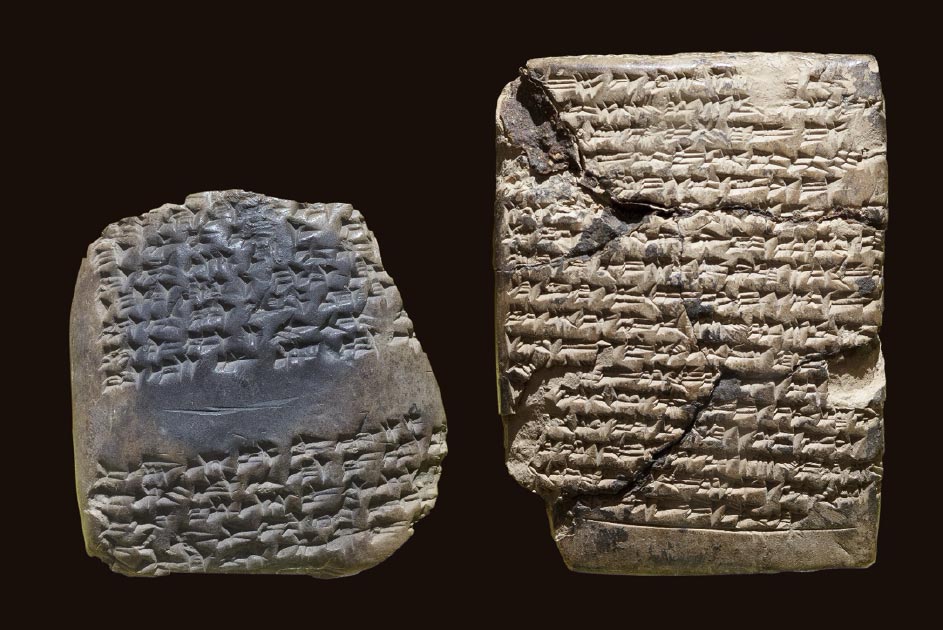Controversial Cuneiform Tablets Tell Tales of Security Dogs and a Lost City
An archaeologist has admitted that around 1,400 cuneiform tablets might have been stolen from Irisagrig, a 4,000-year-old lost Sumerian city in modern day Iraq. While the robbers obviously know the location of the ancient city, the authorities don’t!
In a Live Science article we learn that ‘only looters have the location’ of this ancient city and perplexed archaeologists said this haul of newly examined tablets describes not only the palace of Irisagrig and the animals kept on the grounds, including lions and dogs; but that they also detail a festival held in a temple dedicated to a god of mischief.

A satellite image, captured on Sept. 14, 2017, shows "site 1056," which might be the ancient city of Irisagrig. (DigitalGlobe)
Controversial Ancient Cuneiform Tablets
The 1,400 Irisagrig tablets, along with 600 cuneiform tablets from other archaeological sites in Iraq, are presented by Marcel Sigrist, professor emeritus at École biblique et archéologique française de Jérusalem, and Tohru Ozaki, a retired lecturer at the University of Shizuoka in Japan, in their 2019 book ‘ Tablets From the Irisagrig Archive.’ Sigrist told Live Science the tablets were ‘recorded by hand but not photographed' between 2012 and 2016 in the ‘Oklahoma storerooms of Hobby Lobby.’
This incredible collection of tablets reveals that the controversial company ‘Hobby Lobby’, whose co-owner, Steve Green (featured in an Ancient Origins news piece I wrote) helped found the Museum of the Bible in November 2017 in Washington, D.C., obtained many more artifacts from Iraq than anyone had previously thought possible.
- 450 Stolen Sumerian Tablets are on Their Way Back to Iraq, but it is Just the Tip of the Iceberg
- Ancient Scottish Church Bell Stolen from Sacred Island Leaving Locals Devastated
- Tip-off leads Dublin Police to the Stolen Holy Heart of St Laurence

Inside the Museum of the Bible. (Fishermade/CC BY SA 4.0)
Security Dogs and Kingly Festivals
The culturally priceless hoard of cuneiform tablets inform archaeologists about various aspects of economic and administrative transactions that happened at Irisagrig, and especially how rulers of the city kept lions and fed them with the carcasses of cattle. And stories are told of the ‘lion shepherds’ who took care of the lions receiving rations of beer and bread.
The tablets also inform that those kind folk who ‘cared for the dogs’ also got rations of bread and beer and Sigrist said when you are in the desert, ‘you need protection, custodians, and the dogs are the best custodians you can have.’
The newly found tablets also revealed that many security dogs were kept in Irisagrig's palace and that King Amar-Suen fed dogs at a festival in his name, which took place at the Temple of Enki, the god of mischief and wisdom, who according to the Sumerians (and Akkadians) was the son of Anu, god of heaven, and Nammu, the primordial mother goddess who gave birth to the heavens and the Earth.
A Swelling Scam?
The big question in all this is how a private company and highly-organized gangs of criminals can manage the wholesale robbing and shipping of ancient artifacts, then get away with displaying them to the public at a cost. The answer is “they don’t.”
On June 2017, according to The Washington Post, Hobby Lobby was fined $3 million for illegally importing “thousands of ancient Iraqi artifacts” by shipping the biblical artifacts first to the United Arab Emirates and Israel. About 450 cuneiform tablets and 3,000 clay bullae (a type of seal) were returned to an Iraqi settlement according to a statement from the U.S. Department of Justice.
The combination of the 1,400 newly reported tablets from Irisagrig, 600 newly published tablets from other Iraq sites, and 223 tablets that were seized in January 2011 means that the total number of cuneiform tablets once owned by Hobby Lobby likely exceeds 2,200.
- Deciphering Cuneiform to Get a Handle on Life in Ancient Mesopotamia
- The Controversial Road to the Recovery of Cuneiform Texts
- Professional Art Detective Tracked Clues to Find Stolen Cypriot Mosaic
Squeezing the Secret of the Lost City
In my 2017 Ancient Origins article, I detailed the post-trial comments made by a Hobby Lobby spokesperson who said the company had ‘only erred by relying on artifact dealers who did not understand how to properly ship the items.’ But surely this new haul of potentially illegal artifacts adds to the culpability the company has involving the illegal recovery of artifacts, to a much greater degree than they claimed in 2017?

A cuneiform tablet illegally imported by Hobby Lobby in 2007. (Public Domain)
One possibly effective way to rumble the looters would be squeezing the information out with a significant bribe. It is a certain type of moron that finds themselves digging into an ancient site at night under watchful and armed gang masters, for cash, and it is doubtful these clandestine tomb robbers are being paid that much once it distills down the chain, which begins at a museum: so offering a reward for any information leading to the archaeological discovery of Irisagrig might be worth a try.
Fight fire with fire, cash with cash.
Top Image: A cuneiform tablets (representative image) Source: dimamoroz / Adobe Stock
By Ashley Cowie




















Comments
Yes, I find it amusing..But… ‘Stolen?’ From who? ISIS? I would also question the self-bestowed entitlement to everything assumed by the academics.
Terry Edwards
Anyone else find it amusing that a good Christian group was populating their bible museum with stolen artifacts?